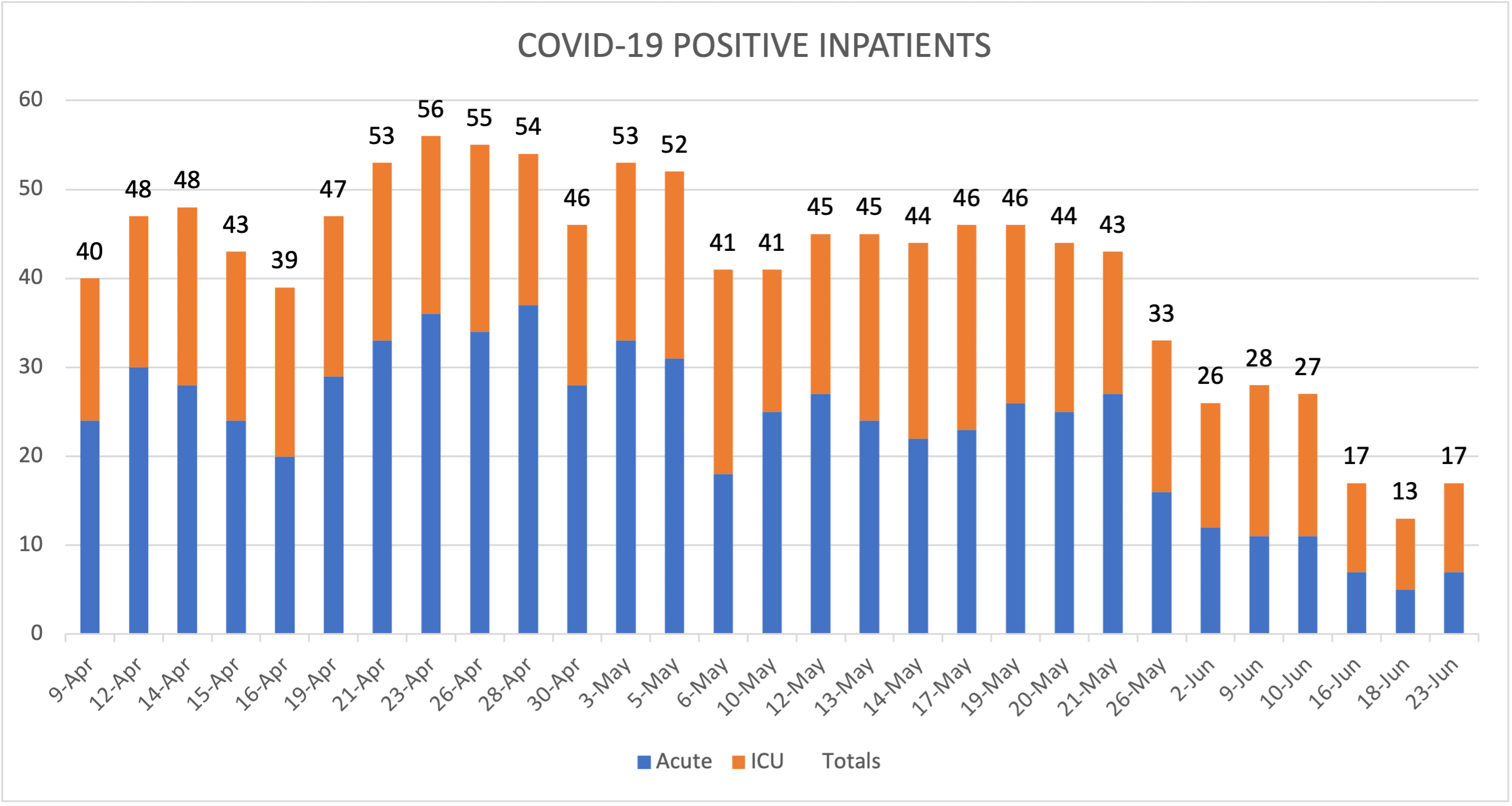Data Snapshot
UW Medicine Hospitals:

King County: The county reported 407 *new positive cases and 0 new deaths on June 23.
*The Washington Department of Health has released 314 delayed positive results, ranging from 11/18/21 to today. The number of new since yesterday cases excluding the backlog is 93 positives.
Washington: The state reported 412,581 cases and 5,889 deaths as of June 22.
United States: The CDC reports 33,395,620 cases and 600,086 deaths as of June 23.
Global: WHO reports 179,065,823 confirmed COVID-19 cases and 3,886,347 deaths as of June 24.
Numbers update frequently, please follow links for most up-to-date numbers.
UW Medicine COVID-19 Vaccine Distribution Update
Total Vaccine Doses Administered: 345,795
- Total first dose: 169,099
- Total second dose: 176,696
As of June 23, 2021.
UW Medicine in the News
The New York Times: How to Have the Hard Vaccination Conversations
Featuring: Nancy Jecker, Bioethics and Humanities
“Vaccination status is a key factor in deciding whether to meet with someone indoors or outside, masked or unmasked, or even if you want to re-evaluate the relationship. These choices will often come down to personal risk tolerance — maybe you’d prefer to get your hair cut only by a vaccinated stylist, or maybe you don’t mind if your child’s soccer coach isn’t vaccinated if they’re practicing outdoors. But remember that nobody owes you an answer, said Nancy S. Jecker, a professor of bioethics and humanities at the University of Washington School of Medicine. ‘You can always ask,’ she said, but the other person could have reasons to keep his or her decision private. ‘It might have to do with something like pregnancy status, or an underlying chronic condition, or someone’s immigration status.’”
KOMO News: Two reasons why doctors say anyone who’s had COVID still needs to get poked
Featuring: Stephaun Wallace, Global Health
“When you get COVID, whether you have symptoms or not, you get some immunity to the virus – but only for a while. That’s why medical experts say it’s important to get vaccinated, even if you’ve had the disease. ‘It will boost your immune systems overall protections because what we see from natural antibody protection levels is they wane, kind of quickly after about 90 days,’ said Dr. Stephaun Wallace, a UW medicine professor and vaccine expert at Fred Hutch. Unfortunately, some people get COVID a second time. Getting vaccinated will help protect you from the new variants that may have developed since you were infected.”
Vox: Why are so many variants showing up now?
Video featuring: Alex Greninger, UW Medicine Virology Lab
“Like any virus, SARS-CoV-2 has been mutating constantly since the beginning of the pandemic. Until November 2020, though, that didn’t seem to matter. That’s when scientists in the United Kingdom noticed an alarming change: The virus had mutated in a way that made it more transmissible. Within a month, similar reports were emerging from places around the world. Suddenly, it seemed the virus was changing at an alarming rate. SARS-CoV-2 hasn’t actually been mutating faster, though. Instead, by letting it spread around the world, we’ve just given it more and more opportunities to mutate as it replicates. The result is that after countless random mutations, there are signs that the virus is beginning to adapt to our natural defenses. And because it’s completely normal for a virus to change over time, we shouldn’t expect it to stop. The only real way to stop those changes is to stop giving the virus so many opportunities.”
COVID-19 Literature Report
COVID-19 Literature Situation Report is a daily (M-F) newsletter put together by the Alliance for Pandemic Preparedness that provides a succinct summary of the latest scientific literature related to the COVID-19 pandemic.
Key Takeaways: COVID-19 Literature Situation Report June 15, 2021
- The incidence of all-cause mortality among residents of assisted living settings in the US between January and August 2020 was 17% higher compared to the same time period in 2019. Among the 10 states with the highest COVID-19 community spread, during that time period the incidence of all-cause mortality was 24% higher. More.
- COVID-19 vaccination among pregnant women was lowest among those aged 18-24 years (6%) and among Hispanic (12%) and Black women (6%) out of 22,197 pregnant women in the US identified in CDC’s Vaccine Safety Data Link as of May 8, 2021. Of those initiating vaccination 68% had completed either a 1- or 2-dose series. More.
- A third dose of a COVID-19 mRNA vaccine received a median of 67 days after the second dose was not able to elicit detectable anti-SARS-CoV-2 antibody responses in 53% of a cohort of solid organ transplant recipients (n=30). Prior to the third dose, 80% of participants did not have detectable antibody responses after completing the 2-dose vaccination series. More.
- SARS-CoV-2 infections caused by the B.1.617.2 (Delta) variant of concern were at increased risk of hospitalization (HR=1.9) compared to the B.1.1.7 (Alpha) variant, according to a whole population cohort study in Scotland, where the B.1.617.2 (Delta) has become the dominant variant. Estimated vaccine effectiveness 14 days after the second dose against infection was reduced against B.1.617.2 (Delta) compared to B.1.1.7 (Alpha) for the Pfizer-BioNTech (92% vs 79%) and Oxford-AstraZeneca vaccine (73% vs 60%). More.
COVID-19 Literature Surveillance Team, is an affiliated group of medical students, PhDs and physicians keeping up with the latest research on SARS-CoV-2 / COVID-19 by finding the newest articles, reading them, grading their level of evidence and bringing you the bottom line.
Read the latest report: June 18 | Weekly COVID-19 LST Report.
Tweet of the Week
Introducing a new visualization tool we've made in partnership with @TheCOVIDCollab that shows data on people’s openness to receiving a #COVID19 vaccine by ZIP code and county for the entire United States. #DataViz #VaccineHesitancy
➡️https://t.co/53tkkBSqjv pic.twitter.com/IBo0iSDTKc
— Institute for Health Metrics and Evaluation (IHME) (@IHME_UW) June 24, 2021
